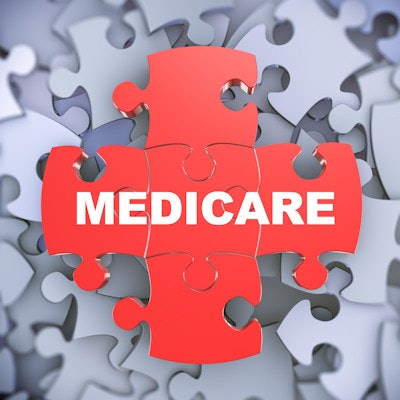
The U.S. Centers for Medicare and Medicaid Services (CMS) is expanding access to dental care by finalizing payment for services deemed "integral to covered medical services," according to the Calendar Year 2023 Physician Fee Schedule final rule that was released on November 1.
The new rule clarifies and finalizes policies in which Medicare Parts A and B will pay for dental services when they are essential to the specific treatment of a beneficiary's primary medical condition. Also, Medicare will pay for services, such as dental exams and treatments prior to or simultaneously with organ transplants, cardiac valve replacements, and valvuloplasty procedures. Coverage begins in 2023, according to a CMS press release.
Beginning in 2024, Medicare will pay for dental exams and services prior to a beneficiary's treatment for head and neck cancer. Additionally, CMS is establishing an annual process to review public comments on other circumstances in which Medicare should pay for dental services, and it is working to address feedback and questions about operational aspects of billing and claims processing for these dental services, according to the release.
"Providing whole person support and services through Medicare will improve health and wellbeing for millions of Americans and even save lives," U.S. Department of Health and Human Services Secretary Xavier Becerra said in the release.
How it began
On July 7, the CMS announced proposed changes for payments under the fee schedule rule and Medicare Part B issues that would include Medicare paying for dental exams and care preceding certain procedures, including organ transplants. The agency announced the proposal weeks after more than 100 U.S. legislators requested that the CMS broaden the definition of medically necessary dental coverage. Also, lawmakers told the U.S. agency that dental services should be considered medically necessary for Medicare recipients with conditions that can be worsened by oral bacteria and infection, including diabetes and multiple sclerosis.
Though the ADA actively encouraged its members to oppose the Biden administration's proposal to add a dental benefit to Medicare Part B in the fall of 2021, it supported the CMS proposal that was just finalized. However, at the time, the ADA told the CMS it wanted clarity on the administration and reimbursement of benefits.
The CareQuest Institute of Oral Health also has supported Medicare expanding access to dental care. A recent report from the institute showed that expanding Medicare dental coverage could save the U.S. up to $42 billion per year for patients with diabetes and heart disease.
Other changes for 2022
In addition to the changes to dental, the CMS is expanding access to cancer screenings and behavioral health while also reducing the conversion factor in the fee schedule.
For 2023, the final conversion factor is $33.06, a decrease of $1.55 to the factor of $34.61 in 2022. The conversion factor cut is due to budget neutrality adjustments required by law, which will be 0% in 2023, according to the CMS.
Also, the 3% supplemental increase to the physician fee schedule payment, which was implemented to offset financial losses and higher expenses healthcare professionals incurred due to the pandemic, is expiring.
The changes also include payment for telehealth opioid treatment programs with buprenorphine, which is used to treat opioid use disorder. Additionally, eligible programs that provide mobile services, such as with vans, can bill Medicare for opioid use disorder treatment services.




















